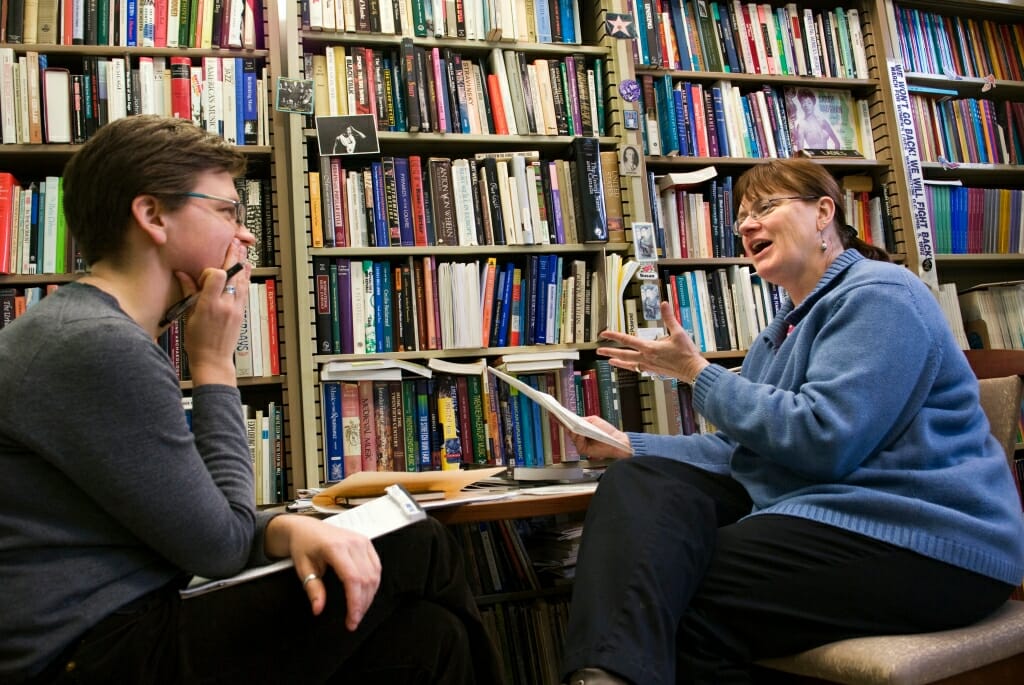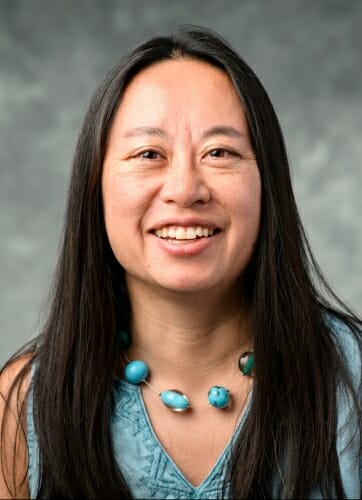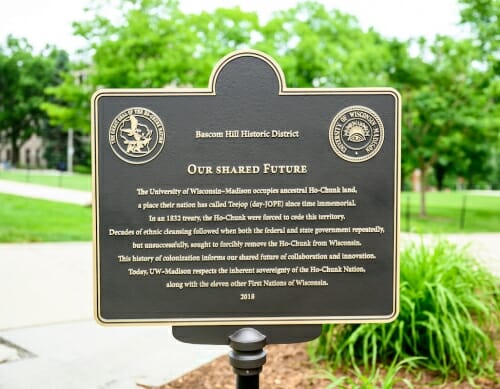Initiative enhances library holdings to support research

Susan Cook (right) meets with graduate student Jessica Courtier in the Mosse Humanities Building in 2008. Cook is director of UW–Madison’s Mead Witter School of Music and principal investigator for the Women Composers Score Project.
Twelve projects have received funding through the Library Collections Enhancement Initiative, an Office of the Vice Chancellor for Research and Graduate Education pilot program to strengthen campus research capacities by providing UW–Madison libraries with flexibility to address critical and emerging collections needs.
“As rising journal and database subscription costs put increased pressure on academic research library collections budgets, demand for a wide range of library materials —historic and contemporary — by faculty and students alike remains high,” says Florence Hsia, associate vice chancellor for research in the arts and humanities. “We are excited to support campus libraries and fill significant gaps in scholarship and diversity by supplementing existing library holdings.

Florence Hsia
In addition to building collections in specific research areas, Hsia adds, the funding will extend the ability of UW–Madison scholars to conduct and broaden their research with “hard-to-find periodicals and ephemera, as well as rare works held in UW–Madison’s Special Collections.”
One of the projects, “Creating an Indigenous Pedagogy Collection,” builds on the university’s commitment to the Ho-Chunk Nation, as represented by the Our Shared Future Heritage Marker and ongoing activities to engage in deeper understanding of the Ho-Chunk Nation and other regional indigenous histories and cultures.
While UW–Madison Libraries hold a collection of books focused on American Indian studies, this project highlights the need for a cohesive indigenous pedagogy collection, explains Larry Nesper, professor of anthropology and director of American Indian Studies. UW–Madison’s will be one of a few collections in the United States focused on Indigenous pedagogy.
Each proposal in the Library Collections Enhancement Initiative must be led by at least one faculty member in partnership with at least one librarian with relevant subject expertise. Nesper’s co-principal investigator on the project is Jim Jonas, senior academic librarian.

The “Our Shared Future” plaque, intended to raise awareness that the UW–Madison campus was built on ancestral Ho-Chunk land, is pictured on Bascom Hill. Click on photo for link to text and dedication ceremony. Photo: Bryce Richter
Another project, the “Women Composers Score Project,” will address a gap in the UW–Madison Mills Music Library by acquiring about 200 scores by women composers. As graduate students across the fields of music study and performance look to diversify their performances or ask urgent questions, and as faculty seek to guide and explore both musical inclusivity and gender issues in music, they all require printed scores.
The individual scores aren’t necessarily rare, as they are in-print, commercial publications, explain principal investigators for the project Susan C. Cook, director of and professor in the Mead Witter School of Music, and Jeanette Casey, head of the Mills Music Library. The value comes in strengthening the collective presence of music by women representing a variety of cultural backgrounds, composed in any time period, and written for a range of instruments and voices.
In addition to the Mead Witter School of Music, these library acquisitions will support the Department of Gender and Women’s Studies and the Interdisciplinary Theatre Studies program. Other academic units also have an interest in women and music, particularly non-Western-focused studies and cultural studies.
“Having access to these kinds of musical materials is important now more than ever as we seek to make what we do as relevant to as many people as possible,” Cook says.
The Library Collections Enhancement Initiative projects are funded with support by a $250,000 investment from the OVCRGE with support from the Wisconsin Alumni Research Foundation.
To learn more about the projects, visit the Initiative site.
